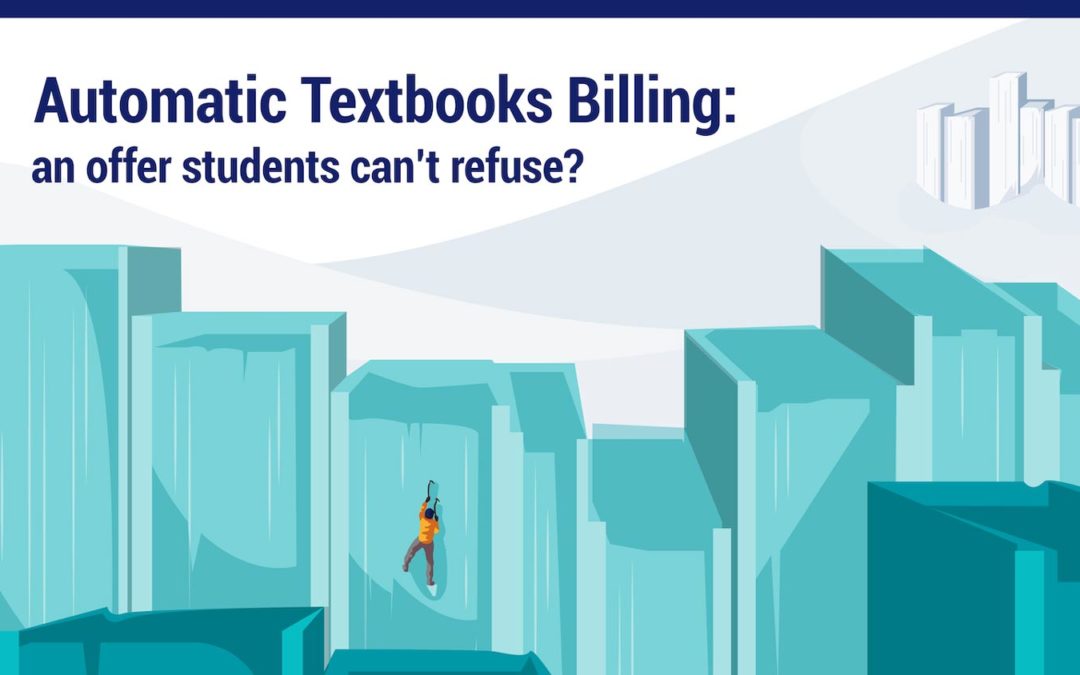The U.S. Public Interest Research Group, a Michelson Spark Grant recipient, released the findings of its latest study examining the murky tactics textbook publishers are using to boost flagging profits, often at the expense of student choice. “Automatic Textbook Billing: An Offer Student Can’t Refuse?” spotlights how under new contracts struck between publishers and institutions of higher education, students are being automatically charged for digital learning materials and deprived of the opportunity to shop around. The report reveals some troubling trends that call into question whether these terms are in the best interest of students and faculty.
Supported by a Michelson Spark Grant, the U.S. Public Interest Research Group (PIRG) embarked on a first-of-its-kind review examining a new business model that textbook publishers are employing to maintain their position of power in the broken textbooks market. Last month, PIRG released the results of its study in the report, Automatic Textbook Billing: An Offer Student Can’t Refuse?
Following decades of exponential growth that far exceeds inflation, textbook prices have plateaued in recent years as the result of affordability measures such as the used book market and open textbooks. To combat their declining profits, publishers have entered into contracts with institutions of higher education that leverage their new “inclusive access” programs, which can be more accurately described as automatic billing.
Automatic billing allows publishers to add the costs of course materials directly onto a student’s tuition bill. The long-term goal of this model is to promote digital textbook access codes. These codes act as a subscription that provide access to a publisher’s digital library and homework submission platform for a set amount of time. Students are unable to access learning materials after their subscription ends, and since they never own a physical product, they are unable to recoup their costs on the used textbook market.
PIRG reviewed 52 contracts struck between textbook publishers and 31 institutions of higher learning, representing some 700,000 students. The report reveals troubling clauses that are often contained within these contracts, which do not have the interest of the students or faculty in mind. Some of the key findings include:
- Half of all contracts failed to fully disclose their discount structure
- 42% of contracts place limits on schools publicizing these partnerships
- 68% of contracts contained quotas for student subscriptions, which, if not met, would cause the discounts to be eliminated. However, these discounts would be federally required if the student were billed via an opt-out charge rather than automatically
- A third of all contracts allow uncapped annual price increases
- A fifth of all contracts cap the number of students who can receive print editions at 15% of the course enrollment
The clauses call into question whether textbook publishers are focused on providing benefits to their student consumers. Many of the contracts provide incentives for administrators to push faculty to adopt automatically-billed access codes. Furthermore, restrictions on publicizing these arrangements – and responses PIRG received when filing their records requests – reveal that publishers do not want the true nature of these contacts to come to light.
Some publishers may contend that this model provides value to students. If this were true, students would be clamoring to opt into these charges. However, the programs are set up in a murky way that undermines meaningful price transparency and choice for students and faculty.
PIRG’s report is a great resource for campus administrators as they evaluate whether automatic billing contracts are best for their students. The document offers a set of guiding questions institutions can use when making course materials decisions. It also provides recommendations for schools seeking to renegotiate existing automatic billing partnerships in order to best serve students.
We are proud to support PIRG in furthering consumer protections for students in the textbook and instructional materials market. We hope the findings galvanize the adoption of materials and contractual terms that promote choice and long-term affordability.
The Michelson 20MM Foundation and its initiatives are made possible by the generous support of Gary K. Michelson, M.D. and his wife, Alya Michelson. Phase 3 of the Michelson Spark Grant program has been extended until March 23, 2020. To learn more visit our webpage or sign up for notifications using the form below.
